- Home
- William Gibson
All Tomorrow's Parties Page 2
All Tomorrow's Parties Read online
Page 2
“Same here,” Rydell said to this unknown Czech, hitching up the neon-pink Lucky Dragon fanny pack he was contractually obligated to wear on duty. He didn't mind that though, even if it did look like shit: it was bulletproof, with a pull-up Kevlar baby bib to fasten around your neck if the going got rough. A severely lateral customer with a ceramic switchblade had tried to stab Rydell through the Lucky Dragon logo his second week on the job, and Rydell had sort of bonded with the thing after that.
He had that switchblade up in his room over Mrs. Siekevitz's garage. They'd found it below the peanut butter, after the LAPD had taken the lateral one away. It had a black blade that looked like sandblasted glass. Rydell didn't like it; the ceramic blade gave it a weird balance, and it was so sharp that he'd already cut himself with it twice. He wasn't sure what he should do with it.
Tonight's curb check looked dead simple. There was a Japanese girl standing out there with a seriously amazing amount of legs running down from an even more amazingly small amount of shorts. Well, sort of Japanese. Rydell found it hard to make distinctions like that in LA. Durius said hybrid vigor was the order of the day, and Rydell guessed he was right. This girl with all the legs, she was nearly as tall as Rydell, and he didn't think Japanese people usually were. But then maybe she'd grown up here, and her family before her, and the local food had made them taller. He'd heard about that happening. But, no, he decided, getting closer, the thing was, she wasn't actually a girl. Funny how you got that. Usually it wasn't anything too obvious. It was like he really wanted to buy into everything she was doing to be a girl, but some subliminal message he got from her bone structure just wouldn't let him.
“Hey,” he said.
“You want me to move?”
“Well,” Rydell said, “I'm supposed to.”
“I'm supposed to stand out here convincing a jaded clientele to buy blow jobs. What's the difference?”
Rydell thought about it. “You're freelance,” he decided, “I'm on salary. You go on down the street for twenty minutes, nobody's going to fire you.” He could smell her perfume through the complicated pollution and that ghostly hint of oranges you got out here sometimes. There were orange trees around, had to be, but he'd never found one.
She was frowning at him. “Freelance.”
“That's right.”
She swayed expertly on her stacked heels, fishing a box of Russian Marlboros from her pink patent purse. Passing cars were already honking at the sight of the Lucky Dragon security man talking to this six-foot-plus boygirl, and now she was deliberately doing something illegal. She opened the red-and-white box and pointedly offered Rydell a cigarette. There were two in there, factory-made filter tips, but one was shorter than the other and had blue metallic lipstick on it.
“No thanks.”
She took out the shorter one, partially smoked, and put it between her lips. “Know what I'd do if I were you?” Her lips, around the tan filter tip, looked like a pair of miniature water beds plastered with glittery blue candy coat.
“What?”
She took a lighter from her purse. Like the ones they sold in those tobacciana shops. They were going to make that illegal too, he'd heard. She snapped it and lit her cigarette. Drew in the smoke, held it, blew it out, away from Rydell. “I'd fuck off into the air.”
He looked into the Lucky Dragon and saw Durius say something to Miss Praisegod Satansbane, the checker on this shift. She had a fine sense of humor, Praisegod, and he guessed you had to, with a name like that. Her parents were some particularly virulent stripe of SoCal Neo-Puritan, and had taken the name Satansbane before Praisegod had been born. The thing was, she'd explained to Rydell, nobody much knew what “bane” meant, so if she told people her last name, they mostly figured she was a Satanist anyway. So she often went by the surname Proby, which had been her father's before he'd gotten religion.
Now Durius said something else, and Praisegod threw back her shoulders and laughed. Rydell sighed. He wished it had been Durius' turn to do curb check.
“Look,” Rydell said, “I'm not telling you you can't stand out here. The sidewalk's public property. It's just that there's this company policy.”
“I'm going to finish this cigarette,” she said, “and then I'm calling my lawyer.”
“Can't we just keep it simple?”
“Uh-uh.” Big metallic-blue, collagen-swollen smile.
Rydell glanced over and saw Durius making hand signals at him. Pointing to Praisegod, who held a phone. He hoped they hadn't called LAPD. He had a feeling this girl really did have herself a lawyer, and Mr. Park wouldn't like that.
Now Durius came out. “For you,” he called. “Say it's Tokyo.”
“Excuse me,” Rydell said, and turned away.
“Hey,” she said.
“Hey what?” He looked back.
“You're cute.”
3. DEEP IN
LANEY hears his piss gurgle into the screw-top plastic liter bottle. It's awkward kneeling here, in the dark, and he doesn't like the way the bottle warms in his hand, filling. He caps it by feel and stands it upright in the corner that's farthest from his head when he sleeps. In the morning, he'll carry it under his coat to the Men's and empty it. The old man knows he's too sick now to crawl out, to walk the corridor every time, but they have this agreement. Laney pisses in the bottle and takes it out when he can.
He doesn't know why the old man lets him stay here. He's offered to pay, but the old man just keeps building his models. It takes him a day to complete one, and they're always perfect. And where do they go when he finishes them? And where do the unbuilt kits come from?
Laney has a theory that the old man is a sensei of kit-building, a national treasure, with connoisseurs shipping in kits from around the world, waiting anxiously for the master to complete their vintage Gundams with his unequaled yet weirdly casual precision, his Zen moves, perhaps leaving each one with a single minute and somehow perfect flaw, at once his signature and a recognition of the nature of the universe. How nothing is perfect, really. Nothing ever finished. Everything is process, Laney assures himself, zipping up, settling back into his squalid nest of sleeping bags.
But the process is all a lot stranger than he ever bargained for, he reflects, bunching a fold of sleeping bag to pillow his head against the cardboard, through which he can feel the hard tile wall of the corridor.
Still, he thinks, he needs to be here. If there's any place in Tokyo Rez's people won't find him, this is it. He's not quite sure how he got here; things got a little fuzzy around the time the syndrome kicked in. Some kind of state change, some global shift in the nature of his perception. Insufficient memory. Things hadn't stuck.
Now he wonders if in fact he did make some deal with the old man. Maybe he's already covered this, the rent, whatever. Maybe that's why the old man gives him food and bottles of flat mineral water and tolerates the smell of piss. He thinks that might be it, but he isn't sure.
It's dark in here, but he sees colors, faint flares and swathes and stipplings, moving. Like the afterimages of the DatAmerica flows are permanent now, retinally ingrained. No light penetrates from the corridor outside—he's blocked every pinhole with black tape—and the old man's halogen is off. He assumes the old man sleeps there, but he's never seen him do it, never heard any sounds that might indicate a transition from model-building to sleep. Maybe the old man sleeps upright on his mat, Gundam in one hand, brush in the other.
Sometimes he can hear music from the adjacent cartons, but it's faint, as though the neighbors use earphones.
He has no idea how many people live here in this corridor. It looks as though there might be room for six, but he's seen more, and it may be that they shelter here in shifts. He's never learned much Japanese, not after eight months, and even if he could understand, he guesses, these people are all crazy, and they'd only talk about the things crazy people talk about.
And of course anyone who could see him here now, with his fever and his sleeping bags, his eyephon
es and his cellular data port and his bottle of cooling piss, would think he was crazy too.
But he isn't. He knows he isn't, in spite of everything. He has the syndrome now, the thing that came after every test subject from that Gainesville orphanage, but he isn't crazy. Just obsessed. And the obsession has its own shape in his head, its own texture, its own weight. He knows it from himself, can differentiate, so he goes back to it whenever he needs to and checks on it. Monitors it. Makes sure it still isn't him. It reminds him of having a sore tooth, or the way he felt once when he was in love and didn't want to be. How his tongue always found the tooth, or how he'd always find that ache, that absence in the shape of the beloved.
But the syndrome wasn't like that. It was separate from him and had nothing to do with anyone or anything he, Laney, was even interested in. When he'd felt it starting, he'd taken it for granted that it would be about her, about Rei Toei, because there he was, close to her, or as close as you could get to anyone who didn't physically exist. They'd talked almost every day, Laney and the idoru.
And at first, he considered now, maybe it had been about her, but then it was as though he'd been following something back through the data flows, doing it without really thinking about it, the way your hand will find a thread on a garment and start pulling at it, unraveling it.
And what had unraveled was the way he'd thought the world worked. And behind that he'd found Harwood, who was famous, but famous in that way of being famous for being famous. Harwood who they said had elected the president. Harwood the PR genius, who'd inherited Harwood Levine, the most powerful PR firm in the world, and had taken it somewhere seriously else, into a whole other realm of influence. But who'd managed somehow never to become prey to the mechanism of celebrity itself. Which grinds, Laney so well knew, exceedingly fine. Harwood who, maybe, just maybe, ran it all, but somehow managed never to get his toe caught in it. Who managed, somehow, to be famous without seeming to be important, famous without being central to anything. Really, he'd never even gotten much attention, except when he'd split with Maria Paz, and even then it had been the Padanian star who'd made the top of every sequence, with Cody Harwood smiling from a series of sidebars, embedded hypertext lozenges: the beauty and this gentle-looking, secretive, pointedly uncharismatic billionaire.
“Hello,” Laney says, his fingers finding the handle of a mechanical flashlight from Nepal, a crude thing, its tiny generator driven by a mechanism like a pair of spring-loaded pliers. Pumping it to life, he raises it, the faintly fluctuating beam finding the cardboard ceiling. Which is plastered, inch by inch, with dozens of stickers, small and rectangular, produced to order by a vending machine inside the station's west entrance: each one a different shot of the reclusive Harwood.
He can't remember going to the machine, executing a simple image search for Harwood, and paying to have these printed out, but he supposes he must have. Because he knows that that is where they are from. But neither can he remember peeling the adhesive backing from each one and sticking them up on the ceiling. But someone did. “I see you,” Laney says and relaxes his hand, letting the dim beam brown and vanish.
4. FORMAL ABSENCES OF PRECIOUS THINGS
IN Market Street, the nameless man who haunts Laney's nodal configuration has just seen a girl.
Drowned down three decades, she steps fresh as creation from the bronze doors of some brokerage. And he remembers, in that instant, that she is dead, and he is not, and that this is another century, and this quite clearly another girl, some newly minted stranger, one with whom he will never speak.
And passing this one now, through a faint chromatic mist of incoming night, he bows his head some subtle increment in honor of that other, that earlier passing.
And sighs within his long coat, and the harness he wears beneath that: a taking in and giving up of one resigned breath, thronged around by the traders descending from their various places of employment. Who continue to emerge into the October street, toward drink or dinner or whatever home, whatever sleep, awaits them.
But now the one with whom he will not speak is gone as well, and he awash in some emotion, not loss exactly but a very particular awareness of his own duration in the world and in its cities, and this one most of all.
Beneath his right arm, reliably concealed, depends a knife that sleeps head down, like a vampire bat, honed to that edge required by surgeons, when surgeons cut with steel.
It is secured there with magnets set within a simple hilt of nickel silver. The blade's angled tip, recalling a wood carver's chisel, inclines toward the dark arterial pulse in the pit of his arm, as if reminding him that he too is only ever inches from that place the drowned girl went, so long ago, that timelessness. That other country, waiting.
He is by trade a keeper of the door to that country.
Drawn, the black blade becomes a key. When he holds it, he holds the wind in his hand.
The door swings gently open.
But he does not draw it now, and the traders see only a gray-haired man, wolfishly professorial, in a coat of grayish green, the color of certain lichens, who blinks behind the fine gold rims of his small round glasses and raises his hand to halt a passing cab. Though somehow they do not, as they easily might, rush to claim it as their own, and the man steps past them, his cheeks seamed vertically in deep parentheses, as though it has been his habit frequently to smile. They do not see him smile.
THE Tao, he reminds himself, mired in traffic on Post Street, is older than God.
He sees a beggar seated beneath a jeweler's windows. In those windows are small empty pedestals, formal absences of precious things, locked away now for the night. The beggar has wrapped his legs and feet in brown paper tape, and the effect is startlingly medieval, as though someone has partially sculpted a knight from office materials. The trim calves, the tapered toes, an elegance calling out for ribbons. Above the tape, the man is a blur, a spastic scribble, his being abraded by concrete and misfortune. He has become the color of pavement, his very race in question.
The cab lurches forward. The man in the loden coat reaches within it to adjust the knife against his ribs. He is left-handed, and he has thought often about such subtle polarities.
The girl who drowned so long ago has settled now, swept down in a swirl of toffee hair and less hurtful memories, to where his youth turns gently, in its accustomed tides, and he is more comfortable that way.
The past is past, the future unformed.
There is only the moment, and that is where he prefers to be.
And now he leans forward, to rap, once, upon the driver's tinted safety shield.
He asks to be taken to the bridge.
THE cab draws up before a rain-stained tumble of concrete tank traps, huge rhomboids streaked with rust, covered with the stylized initials of forgotten lovers.
This spot has a certain place in the local mythology of romance and has been the subject of any number of popular ballads.
“Pardon me, sir,” says the cab driver, through several layers of protective plastic and digital translation, “but do you wish me to leave you here? This neighborhood is dangerous. I will be unable to wait for you.” The question is rote, required by law against the possibility of litigation.
“Thank you. I will be in no danger.” His English as formal as that of the translation program. He hears a musical rattle, his words rendered in some Asian language he doesn't recognize. The driver's brown eyes look back at him, mild and dispassionate, through goggles, shield; multiple layers of reflection.
The driver releases a magnetic lock.
The man opens the door and steps from the cab, straightening his coat. Above him, beyond the tank traps, lift the ragged, swooping terraces, the patchwork superstructure in which the bridge is wrapped. Some aspect of his mood lifts: it is a famous sight, a tourist's postcard, the very image of this city.
He closes the door, and the cab pulls away, leaving behind it the baking-sugar sweetness of exhausted gasohol.
He stan
ds looking up at the bridge, at the silvered plywood of uncounted tiny dwellings. It reminds him of the favelas of Rio, though the scale of the parts is different, somehow. There is a fairy quality to the secondary construction, in contrast to the alternating swoop and verticality of the core structure's poetry of suspension. The individual shelters—if in fact they are shelters—are very small, space being at an absolute premium. He remembers seeing the entrance to the lower roadway flanked with guttering torches, though now, he knows, the residents largely cooperate with the city's air-pollution measures.
“Dancer?”
In concrete shadow she palms the tiny vial. Feral grimace intended to facilitate commerce. This drug causes the user's gums steadily to recede, producing in those few who survive its other rigors a characteristic and terrible smile.
He replies with his eyes, the force of his gaze punching through her intent as if through paper. Briefly in her eyes the light of panic, then she is gone.
Toffee hair swirls in the depths.
He looks down at the toes of his shoes. They are black and very precise, against the random mosaic of impacted litter.
He steps over an empty can of King Cobra and walks between the nearest rhomboids, toward the bridge.
These are not kindly shadows through which he moves, the legs of his narrow trousers like the blades of a deeper darkness. This is a lurking place, where wolves come down to wait for the weaker sheep. He has no fear of wolves, nor of any other predator the city might field, tonight or any other night. He simply observes these things, in the moment.

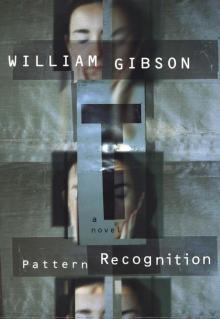 Pattern Recognition
Pattern Recognition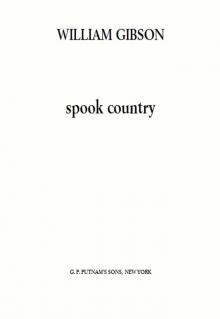 Spook Country
Spook Country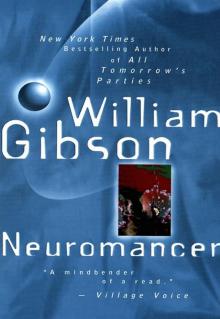 Neuromancer
Neuromancer Skinner's Room
Skinner's Room The Difference Engine
The Difference Engine Mona Lisa Overdrive
Mona Lisa Overdrive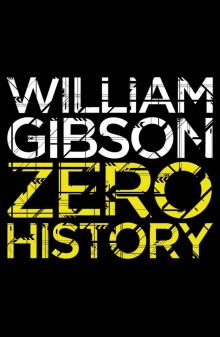 Zero History
Zero History The Peripheral
The Peripheral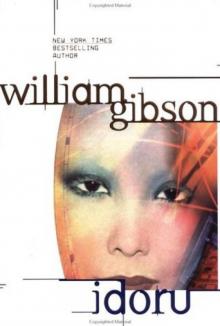 Idoru
Idoru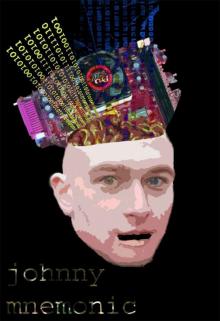 Johnny Mnemonic
Johnny Mnemonic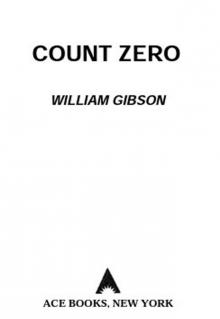 Count Zero
Count Zero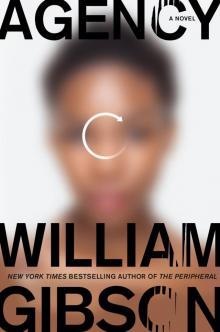 Agency
Agency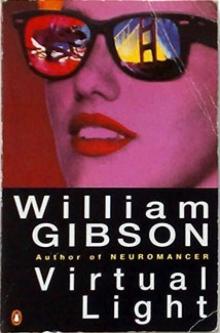 Virtual Light
Virtual Light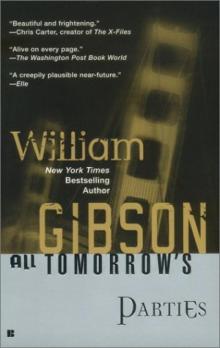 All Tomorrow's Parties
All Tomorrow's Parties The Miracle Worker
The Miracle Worker Disneyland with the Death Penalty
Disneyland with the Death Penalty Idoru tb-2
Idoru tb-2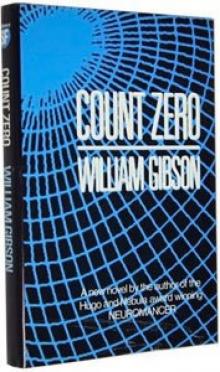 Count Zero s-2
Count Zero s-2 The Gernsback Continuum
The Gernsback Continuum New Rose hotel (tales)
New Rose hotel (tales)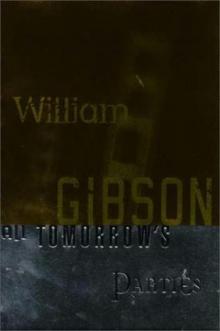 All Tomorrow's Parties bt-3
All Tomorrow's Parties bt-3 Hinterlands
Hinterlands Thirteen Views Of A Cardboard City
Thirteen Views Of A Cardboard City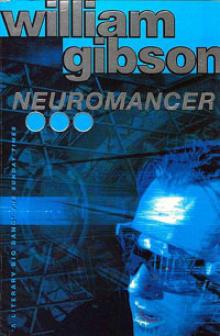 Neuromancer ts-1
Neuromancer ts-1 Virtual light b-1
Virtual light b-1